Rhetorical devices test - Study guides, Class notes & Summaries
Looking for the best study guides, study notes and summaries about Rhetorical devices test? On this page you'll find 16 study documents about Rhetorical devices test.
Page 2 out of 16 results
Sort by
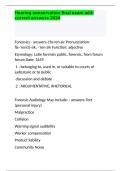
-
Hearing conservation final exam with correct answers 2024
- Exam (elaborations) • 157 pages • 2024
-
- $7.99
- + learn more
Forensics - answers-1fo·ren·sic Pronunciation: f&-'ren(t)-sik, -'ren-zik Function: adjective Etymology: Latin forensis public, forensic, from forum forum Date: 1659 1 : belonging to, used in, or suitable to courts of judicature or to public discussion and debate 2 : ARGUMENTATIVE, RHETORICAL Forensic Audiology May Include: - answers-Tort (personal injury) Malpractice Collision Warning signal audibility Worker compensation Product liability Community Noise Criminal law ADA C...
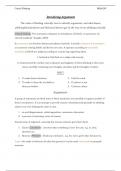
-
Critical Thinking Notes
- Summary • 10 pages • 2023
-
- $5.66
- + learn more
The following content provides: -Introducing Arguments - Test 1 Revision: Definitions Obstacles to rationality & identifying which obstacle to rationality occurs in each passage Identifying arguments (premises and conclusions) in a passage. Difference between reasons and explanations and arguments and non-arguments. ...
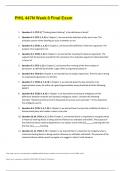
-
PHIL 447N Week 8 Final Exam- Download Exam Questions For Revision To Pass The Exams
- Other • 4 pages • 2023
-
Available in package deal
-
- $15.49
- + learn more
1. Question 1.1. (TCO 1) “Thinking about thinking” is the definition of what? 2. Question 2.2. (TCO 1, 2, 4) In Chapter 1, we learned the definition of the term issue. The principle concern whe n handling an issue is whether or not 3. Question 3.3. (TCOs 1, 2, 3) In Chapter 1, we learned the definition of the term argument. The purpose of an argument is to 4. Question 4.4. (TCOs 2, 3) In Chapter 2, we learned the meaning of inductive arguments. The support that the premises provide for the c...
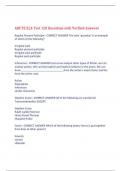
-
ABCTE ELA Test 120 Questions with Verified Answers,100% CORRECT
- Exam (elaborations) • 40 pages • 2023
-
Available in package deal
-
- $11.49
- + learn more
ABCTE ELA Test 120 Questions with Verified Answers Regular Present Participle - CORRECT ANSWER The verb "greasing" is an example of which of the following? Irregular past Regular present participle Irregular past participle Regular past participle Inferences - CORRECT ANSWER Just as we analyze other types of fiction, we can analyze poetry. We can find explicit and implicit evidence in the poem. We can draw ______________________________from the writer's word choice and the form th...
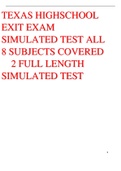
-
TEXAS HIGHSCHOOL EXIT EXAM SIMULATED TEST ALL 8 SUBJECTS COVERED 2 FULL LENGTH SIMULATED TEST
- Exam (elaborations) • 437 pages • 2022
-
- $15.99
- + learn more
Multiple-Choice Questions on Passage 1 Slipping Beauty This question tests basic understanding—vocabulary. The sentence (the first sentence of the paragraph) gives you enough information to choose the correct answer. The word prominent can mean well known (A) or distinguished (D) (as in “she is a prominent person in city government”), but in this sentence, the meaning of the word is projecting (C). That meaning is clear because the sentence says that the man’s paunch (stomach)...
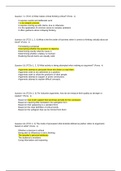
-
PHIL 447N Final Exam Question And Answers( Download To Score An A)
- Exam (elaborations) • 11 pages • 2021
-
- $13.29
- + learn more
PHIL 447N Final Exam Question 1.1. (TCO 1) What makes critical thinking critical? (Points : 4) It requires careful and deliberate work It is an analytic process It requires coming up with claims, true or otherwise It is the application of common sense to complex problems It offers guidance about critiquing thinking Question 2.2. (TCO 1, 2, 4) What is the first order of business when it comes to thinking critically about an issue? (Points : 4) Formulating a proposal Discovering whether the questi...

Did you know that on average a seller on Stuvia earns $82 per month selling study resources? Hmm, hint, hint. Discover all about earning on Stuvia


